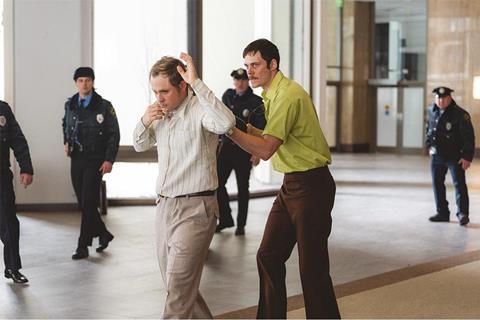The director’s Venice title dramatises the 1977 kidnapping of a mortgage broker by disgruntled landowner Tony Kiritsis

Dir: Gus Van Sant. US. 2025. 104mins
In February 1977, 44-year-old Tony Kiritsis entered the Indianapolis headquarters of the Meridian Mortgage Company, kidnapped VP Richard Hall at gunpoint and kept him hostage in his apartment for 63 hours. It was, landowner Kiritsis asserted, not about money, but about publicising the appalling way he had been treated by the company. For his first feature in seven years, director Gus Van Sant turns this fascinating true crime story into both an entertaining period drama and an evergreen tale of ordinary men pushed into desperate acts.
Skargard’s wiry, intense performance captures this sympathetic, troubling man
Dead Man’s Wire – named after the hokey home-made contraption which connected Hall’s neck to Kiritsis’s shotgun – plays out of competition at Venice before going on to screen at Toronto. With its light-footed screenplay from Austin Colodney and cracking central performance from Bill Skarsgard (It, Nosferatu), this could be a solid commercial prospect for the director, whose last film was 2018’s Berlin competition title Don’t Worry He Won’t Get Very Far On Foot.
The Kiritsis case made huge waves at the time – the whole event was broadcast live, as was the extraordinary press conference he held with Hall still at the business end of his shotgun. Hall wrote a 2017 book about his ordeal, and the following year came documentary Dead Man’s Line. Kiritsis was also the subject of the 2022 podcast ‘American Hostage’, which is now being developed into a television show. Yet many viewers will still be unfamiliar with the case, and Van Sant makes his dramatization easily accessible while retaining the moral grey areas at the heart of the drama.
Kiritsis was actually planning to kidnap Meridian boss Mike O Hall, who is played in cameo by Al Pacino – an obvious nod to Dog Day Afternoon with which this shares an aesthetic and a theme of events spiralling out of control. With Mike in Florida, Kiritsis instead takes his son, Richard (Dacre Montgomery), and demands acknowledgement of the fact that the company exploited him over a land deal – something he fervently believes, even if Meridian dispute it – suitable financial reparations and a formal apology. Police and FBI attempt to deal with a rapidly spiralling situation as the media descends.
While Dead Man’s Wire was originally planned for filmmaker Werner Herzog, with Nicolas Cage in the lead, Kiritsis is an ideal protagonist for Van Sant who, in works ranging from My Own Private Idaho to Drugstore Cowboy and Elephant, has always been drawn to characters on the margins. Kiritsis is certainly that; an honest man who has found himself the victim and left with no choice but to take drastic action. A succinct set-up sees him driving to Meridian, listening to his favourite local DJ Fred Temple (Colman Domingo) play Eumir Deodato’s ‘Also Sprach Zarathustra (2001)’. As the jazz-funk classic, which riffs on the soaring theme from 2001: A Space Odyssey, reaches its euphoric crescendo, Kiristis abruptly turns off the engine – and the key snaps in the lock.
Music plays an important role in Dead Man’s Wire, helping to set time and place while hitting the emotional beats of the narrative. Choices may be a little on the nose – Roberta Flack’s protest song ‘Compared To What’, Butch Cassidy theme ‘Raindrops Keep Falling On My Head’ and an ironic use of Gil Scott-Heron’s ‘The Revolution Will Not Be Televised’ – but they work in the context of the crime caper tone. The film moves along apace, and includes some genuinely funny moments delivered with panache by the strong cast. Cary Elwes is particularly good as incredulous local cop Mike Grable, who can’t quite get his head around the “shit show” unfolding around him.
That’s not to say the film doesn’t take Kiristis’s behaviour seriously. Montgomery’s subdued performance hints at the gravity of the situation, while Danny Elfman’s score highlights both its Burtonesque bizarreness and it’s life-and-death volatility. Production design from Stefan Dechant plays its part too; Kiritsis’s apartment is decorated in claustrophobic 70s browns with sickly orange accents – a deliberately cut-and-paste, oppressive, depressing Seventies interior. And while DOP Arnaud Potier mostly shoots in slick, vivid colour, his kinetic camerawork getting right in the action, there are regular sequences made to look like archive news footage, reminding us that this really did happen.
Kiritsis remains a stoic, strangely endearing presence, grounded by the fact that he truly believes what he is doing is justified. “I’m a goddamn national hero and don’t you forget it” he tells the assembled TV crews – and he is, for a moment, as similarly disadvantaged Americans all over the country lend him their support. Skarsgard’s wiry, intense performance captures this sympathetic, troubling man, while the genuine archive footage that plays the film out suggests that he, and the film, have harnessed the essence of Kiritsis and his outlandish five minutes of fame.
Production companies: Elevated Film, Pressman Film, Balcony 9 Productions, Sobini Films, RNA Pictures, Pinstripes
International sales: WME, filmsalesinfo@wmeagency.com
Producers: Cassian Elwes, Joel David Moore, Mark Amin, Sam Pressman, Tom Culliver, Matt Murphie, Andrea Bucko, Veronica Radaelli, Paula Paizes, Remi Alfallah, Noor Alfallah, Billy Hines, Siena Oberman, Gordon Clark
Cinematography: Arnaud Potier
Production design: Stefan Dechant
Editing: Saar Klein
Music: Danny Elfman
Main cast: Bill Skarsgard, Dacre Montgomery, Al Pacino, Colman Domingo, Myha’la, Cary Elwes, Kelly Lynch, Todd Gable, Mark Helms, Michael Ashcroft















![[L-R]: Amanda Villavieja, Laia Casanovas, Yasmina Praderas](https://d1nslcd7m2225b.cloudfront.net/Pictures/274x183/6/4/1/1471641_pxl_20251224_103354743_618426_crop.jpg)








